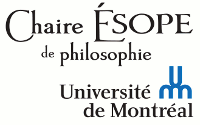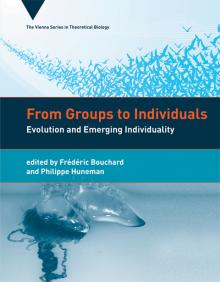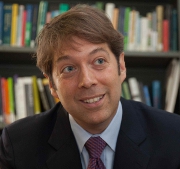
“A thoroughly modern take on the timeless questions surrounding the evolution of groups and individuality—rich and rigorous, creatively contrarian, and occasionally iconoclastic.”
—Dan McShea, Biology, Duke University
“The question of biological individuality, where one individual ends and another begins, has moved rapidly in recent years, from an occasional and rather exotic question at the boundaries of the subject to the cutting edge of the philosophy of biology. This volume brings together many of the leading contributors to this development and will provide the perfect starting point for anyone interested in understanding how this question has come to be so fundamental to our understanding of living processes.”
—John Dupré, University of Exeter; author of Processes of Life: Essays in the Philosophy of Biology
“The final sentence of Bouchard’s chapter, which is also the book’s final sentence, is a research ‘‘manifesto’’: ‘‘Focusing on individuals and how they sometimes evolve into superindividuals is the way forward in our messy multispecies world’’ (p. 261). There is much that is original and insightful in From Groups to Individuals. Evolution and Emerging Individuality. A good read!”
—Francisco J. Ayala, Biology, UC Irvine in History and Philosophy of the Life Sciences |
"This comprehensive and rather engaging collection will get you right up to date. (...) Included here are some useful reflections on the notion of the “superorganism,” something that in recent years has had a life in biology (with its championing by Edward O. Wilson) and out of biology (with the championing of the Gaia hypothesis by James Lovelock).
The volume concludes with a sprightly essay on symbiosis by one of the editors, the French-Canadian philosopher of biology Frédéric Bouchard. I was glad to see how he linked his discussion to human digestion, with interesting implications for a subject that this journal has long championed, evolutionary medicine. Perhaps what seems at first to be a rather ethereal collection does in the end have real implications for life. It would be nice to think so." Michael Ruse in Quarterly Review of Biology
"(...)To sum up, I would say that, while this collection will definitely be of interest to the specialist, its chief merit is perhaps providing an accessible and up-to-date synthesis of biological individuality in an evolutionary context. It offers an original and remarkably coherent perspective on this notion, focusing not only on its most philosophical aspects, but also on its multiple biological (e.g., evolutionary and physiological) facets. I strongly recommend it to all the biologists and philosophers who were once puzzled by this simple question: what is an organism?"Johannes Martens in Notre Dame Philosophical Reviews
" (...)the reader discovers every argument about how groups, colonies, and societies can be unified within an integrated whole, and is thus ready to make up her/his own mind on the subject. Any scientists or students willing to understand how individuals come to existence should read this thought-provoking and inspiring piece of work." Bernard Thierry in American Journal of Human Biology
"Careful editing prevents the differences among the eleven thought-provoking individual
contributions from hindering the emergence of a coherent whole, aiming at a theoretical
framework for the notion of biological individuality. (...) Whilst advanced knowledge of key issues in the philosophy of biology may sometimes be required, there are many well-developed considerations and new arguments that invite us to see familiar issues from different angles, so that, taken as an individual whole, the book merits positive selection." Christian Sachse forthcoming in Studies in History and Philosophy of Science. Part C: Studies in
History and Philosophy of Biological and Biomedical Sciences.
|



